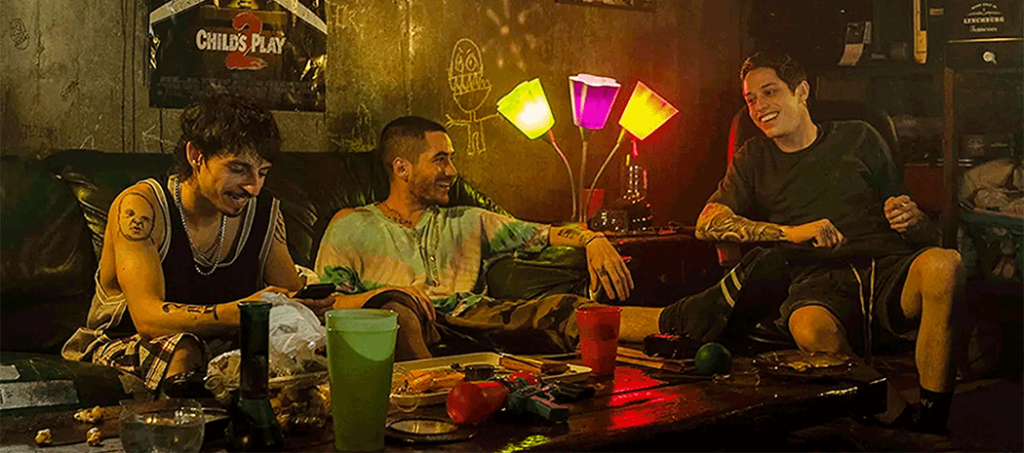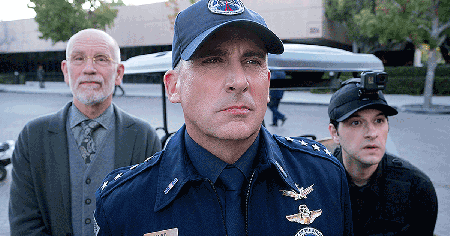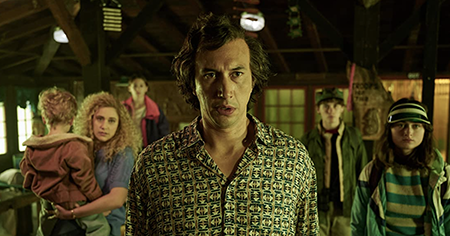
review | The King of Staten Island
Attempting to capture the aimlessness, absurdity, and grunge of the underclass, Judd Apatow utterly misses the mark
by Michael Gaughn
January 27, 2020
I know that people like the characters in The King of Staten Island exist but I don’t like paying to be reminded of that fact, especially over a grueling two hours and 17 minutes. I felt the same revulsion watching American Factory, another grisly reminder of the underclass spawned by successive generations of callous, punitive economics and an increasingly toxic pop culture. Yes, this is who we’ve become, but it’s nothing to be proud of.
I can’t imagine what kept Apatow motivated through the protracted process of developing, writing, shooting, and doing post on something this pointless. When he sat down every morning, what did he see in this dung heap that gave him the energy to carry on?
The answer may lie with the Apatow house brand—which is something distinctly different from his style as a filmmaker, which I’ll get to it a minute. Imagine Freaks & Greeks grafted onto Buñuel’s Los olividados, and you’ll have some idea of where he was trying to go with Staten Island. And that could have potentially been fertile ground. Problem is he couldn’t resist the impulse to apply his patented warm and fuzzy formula in an effort to redeem his irredeemable characters, so what starts out like Trainspotting ends up a lot like It’s a Wonderful Life. The former rings true, but something nobody really needs to be exposed to; the latter is just nauseating.
His distinctive style has been apparent from his earliest directorial efforts. (Even a casual observer can see the clear through-line from the freeze-pop scene in Freaks & Geeks to Staten Island.) And his work has the potential of being tremendously expressive—if he can ever find the right material. The problem is, Freaks remains his strongest effort to date, aside from some occasional moments in 40 Year Old Virgin and This is 40. Whenever he’s tried to bring some discipline to his work and act more like a “filmmaker,” like with Knocked Up, the egregious Funny People, and here, he always goes seriously awry. But he’s definitely onto something, and might actually somehow someday get far enough out of his own way to latch onto a more promising subject.
Staten Island was supposed to have had a limited theatrical run, mainly at drive-ins, but Universal at the last minute decided to send it straight to video. My guess is they couldn’t figure out who the audience was supposed to be and were afraid it would flop hard even at a time when people are starved for entertainment.
But premium video on demand wasn’t such a great alternative. I had to fork over 19 bucks to watch this on Amazon—that’s a hefty amount to wager on a film that doesn’t give you much of a clue of what you’re in for. The bigger problem is that you can be halfway through the seemingly interminable slog of watching it and still not have a clue.
I know it’s heresy to bring this up at a time when every film sprawls and nobody has the creative discipline, or a strong enough sense of mercy, to cut anything to the length it actually deserves, but Staten Island could have easily been a nice, tight 90 minutes and still have been, for better or worse, the same film. At least I would have gotten 45 minutes of my life back.
I don’t have much to say about the acting except that, if you’ve ever seen an Apatow film, you’re seen all of these performances before. And there’s the recurring problem of nepotism. What has to happen to keep Apatow from casting his own family members? His daughter Maude is OK as Pete Davidson’s responsible, grounded, empathetic (insert morally laudable trait here: _____) sister, but is in no way exceptional and is a kind of poster child for the daughters of privilege swelling the acting ranks in New York and LA, people with only modest abilities but terrific connections.
There’s nothing exceptional happening on the technical side either. Staten Island is shot in the standard-issue faux documentary, “independent film” style that’s been dragging down serious films for at least a decade now. (Did I mention that this isn’t really a comedy?) Everything is well enough shot and assembled, but this could have been presented as a radio play with pretty much the same impact. Part of the almost $20 price of admission can be attributed to Staten Island being a 4K HDR release, but I couldn’t see where that really helped or hindered anything.
The audio is perfectly serviceable, and can’t be held accountable for the unpleasant accents and some of the actors’ inability to articulate their lines. There are the obligatory pop-music cues meant to create a false sense of energy, and some firearms are discharged during a robbery scene. I guess the gunshots sound realistic. I’m kind of glad to say I have no way of knowing for sure.
Maybe this thing panders just enough to have an audience beyond self-pitying brats. God only knows Staten Island embodies the corrosive masochism that lies at the black heart of the culture. I just know that trying make our dance with Thanatos more palatable by turning it into something that veers awful close to becoming a musical isn’t healthy for anybody. If you really feel like you really need to piss away $20 online, go play some poker instead.
Michael Gaughn—The Absolute Sound, The Perfect Vision, Wideband, Stereo Review, Sound & Vision, The Rayva Roundtable, marketing, product design, some theater designs, a couple TV shows, some commercials, and now this.
PICTURE | Shot in standard-issue faux documentary, “independent film” style, it’s hard to see where 4K HDR brings anything to the proceedings
SOUND | The audio is perfectly serviceable and can’t be held accountable for the unpleasant accents and some of the actors’ inability to articulate their lines
© 2025 Cineluxe LLC





